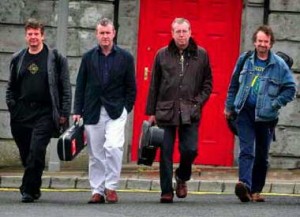Think about the bands Andy Irvine has been associated with—Sweeney’s Men, Planxty, De Danaan, Mozaik and Patrick Street, to name but a few.
Think about the names he could drop, people he’s rubbed shoulders with at one time or another, all of them stars in the Irish traditional firmament: Kevin Conneff, Davey Spillane, Frankie Gavin, Bill Whelan, Kevin Burke, John Carty, Joe Dolan, Johnny Moynihan, Paul Brady, Jackie Daly, Christie Moore, Gerry O’Bierne, Matt Malloy, Dolores Keane, Arty McGlynn … and now I’m just plain running out of breath.
Sure, we’re blessed with relatively new, young Irish traditional supergroups like Teada, Solas, Cherish the Ladies and Danu—but probably none of them ever would have sprouted up at all, were it not for the likes of Andy Irvine and his small but influential circle of friends. They really started Irish music along on its current path to worldwide acceptance and popularity, bridging the gap between the unquestionably influential Clancys and the bands of today.
“We all kind of grew up together,” says Irvine of his many friends in the Irish music scene of the early ‘70s. “Thirty-five years ago, there was another generation of musicians that were in charge. We were young pups, but gradually the mantle decended upon us.”
When Irvine first started to appear on the scene, Irish music was in the throes of a “ballad boom,” probably best personified by the Clancy Brothers, whose music Irvine liked—but whose sweater-clad on-stage personas, he did not. The Kingston Trio also was quite popular at the time, and Irvine was not a fan. What sprang from his discontent was a band called Sweeney’s Men, which he founded in 1966 with Moynihan and Dolan. With Sweeney’s Men, the ballads continued unabated—though the band apparently took a kind of perverse pride in not singing ballads the crowd could sing along with—and polished instrumentals moved to the fore.
Not long after the dissolution of Sweeney’s Men came Irvine’s next big band—Planxty. For Irvine, that’s when the “ballad boom” breathed its last. “The real breakthrough was in ‘72 when Planxty started playing,” he says. “It was like a moment in time that was waiting to happen.”
Fast forward to Patrick Street, conceived of as a band that showcased “the best of the best.” It sounds like promotional hyperbole until you consider the musicians who have wound up in Patrick Street. The current lineup includes founders Irvine, singing and playing bouzouki and mandolin, along with fiddler Kevin Burke, formerly of the Bothy Band. John Carty plays fiddle, banjo and flute, and Battlefield Band vet Ged Foley plays guitar. In previous incarnations, the band included button accordion wizard Jackie Daly, a De Danaan alum, and guitarist Arty McGlynn (Planxty). “Best of the best” accurately sums it up.
Now the band is on the road again, in support of a new CD, “On the Fly,” from Burke’s Loftus Records. (Jackie Daly also makes an appearance on the recording.)
Some things about the band are clearly new and different, but at its core, the sound is the same, Irvine says.
“We played a bit in Ireland over the summer with Jackie,” he says. “And then we did a couple of gigs without him. It’s really quite remarkable the difference in themusic. The music had a lot more air in it without the accordion. You could hear everything a little bit better. We all noticed it. I’m not saying that it’s better … it’s just different.”
Also a bit different is the addition of Carty, who has been with the band since 2005, mostly as a result of a comment by Ged Foley.
“He said, maybe we were getting into a bit of a rut, and we should do something about it,” Irvine says. “It was Ged who suggested having John play with us. It seemed like a real good idea to me.”
Carty’s presence also led to the new CD. Members of the band saw it as a great opportunity to record his unique contribution to the band.
You can hear Patrick Street for yourself Wednesday, Nov. 14, at 7:30 p.m., at Calvary Centre for Culture and Community, 801 S. 48th Street in Philadelphia.

